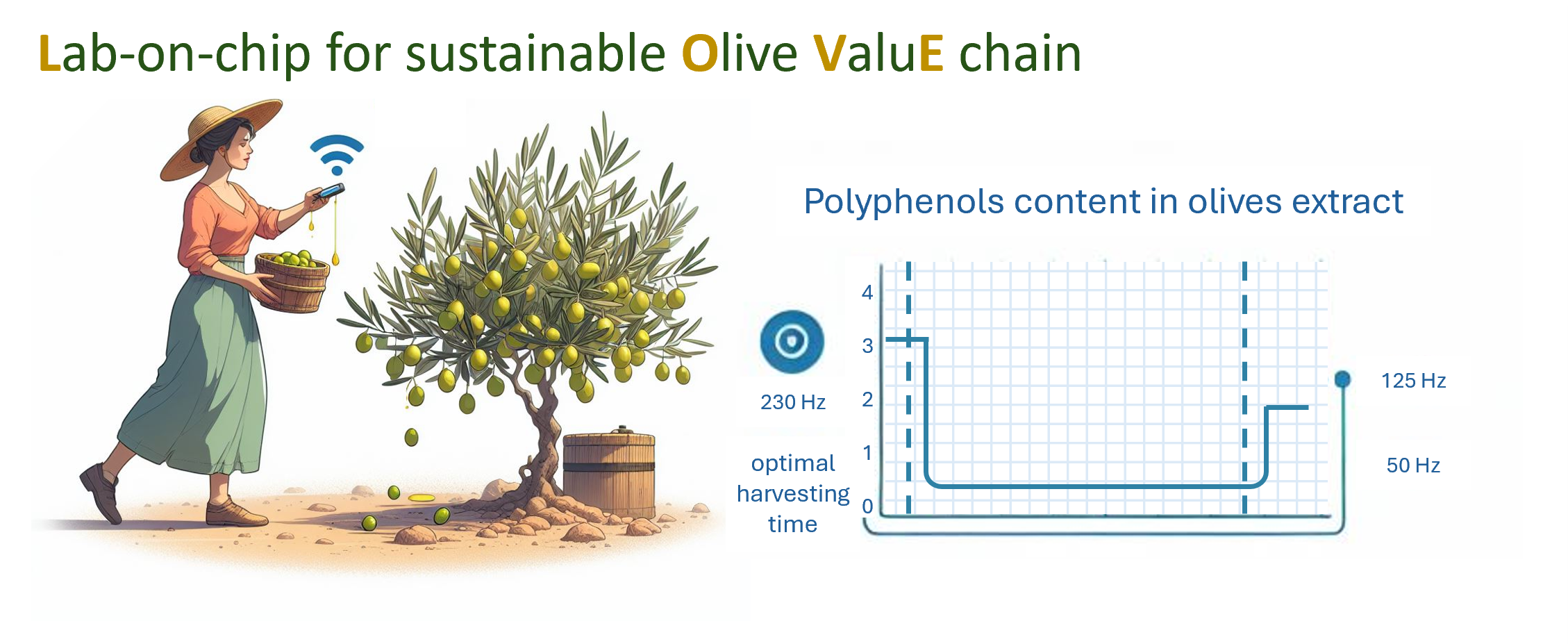PRIN 2022 – Grant Number: 2022M4WB3M
We LOVE high-quality olive products
The project LOVE aims at the development of a lab-on-chip for the rapid detection of the polyphenolic content of olive drupes as an alternative to conventional costly and polluting laboratory analysis, in the optics of making the choice of harvest time easier and more profitable. The phenolic content of olives will be correlated to olive ripeness degree and to the potential EVOO quality, from the compositional and sensory point of view. This new device could be a useful tool to evaluate olive ripening degree and to individuate the optimal harvest time, which is a critical point for producing high quality EVOOs, allowing for an important improvement in the production process. The device will be customizable according to the needs of both farms and analysis laboratories and could be further developed as a component of a novel device for in-situ determination of olive fruit phenolic content.

A push towards innovation
Development of a sensing platform based on acoustic waves for the rapid detection of polyphenolic content in olive drupes
Project goals
1) Optimization of the functionalization of gold sensors for the detection of olive fruits phenols
2) Development of a sample preparation procedure that fulfils the requirements of the sensor
3) Sensor performance evaluation in terms of phenols detection
4) Investigation of the correlation between LoC measurements and phenol composition of olives and EVOOs through data analysis with chemometrics tools
5) Development of prediction models of the quality parameter related to ripening, but also of the EVOO chemical and sensory quality
Project structure
The project is organized in five work packages:
- WP1: Sample preparation and development of functionalization strategies for the detection of polyphenolic compounds
- WP2: Lab-on-Chip engineering and preliminary testing
- WP3: Final validation of the LoC device
- WP4: Completion experiments, final data analysis and indexing
- WP5: Project coordination and results dissemination
Project partners


Project stakeholders


Publications
- G. Puntoni, “Sviluppo e ottimizzazione di strategie di funzionalizzazione di biosensori acustoelettrici per la rilevazione di polifenoli nell’oliva”. Master’s thesis in Molecular Biotechnology, UNIPI (2025).
- Check back soon for updates!
Project coordinators
- PI: Prof. Chiara Sanmartin, PhD
Dipartimento di Scienze Agrarie, Alimentari e Agroambientali, Università di Pisa (DISAAA)
- Dr. Antonella Battisti, PhD
Istituto Nanoscienze, Consigio Nazionale delle Ricerche (CNR-NANO)
Project collaborators
- Dr. Isabella Taglieri
- Prof. Francesca Venturi
- Dr. Alessandro Bianchi
- Dr. Giorgia Tori
- Dr. Neetu Malik
- Dr. G. Puntoni
- Dr. Mariacristina Gagliardi
- Dr. Marco Cecchini
Project showcase
Past events:
- SIBPA National Congress 2024
- RBC Conference 2024
- SIF National Congress 2024
- VinItaly 2025
- FestAmbiente 2025
- CNR-NANO Workshop 2025
- GreenChemCO 2025
- FisMat 2025
- EBSA International Conference 2025
Next events:

Olive oil is a traditional and ancient food, essential to the Mediterranean diet and popular worldwide for its nutritional and health benefits. High-quality extra virgin olive oil (EVOO) can only be made from healthy, fresh olives at the right ripeness. Determining the ideal ripeness is crucial for balancing the oil’s chemical, sensory, and stability properties. To find a simple and cost-effective way to measure phenolic content in olives, many methods have been developed. Recently, acoustic sensors have gained interest in food science, especially for oil and wine production. This study aims to create an acoustic wave-based platform to quickly detect polyphenol content in olives and to determine their ripeness. The sensing platform could provide fast, on-site assessments of olive quality, unlike the current method of sending samples to a lab and waiting for results. Using reliable and affordable tools to determine olive ripeness can help producers to harvest at the right time, improving EVOO quality. The device could also be used in industrial milling plants to evaluate and classify olives, preventing the mixing of low and high-quality olives and optimizing the extraction process. Additionally, the sensing platform could be integrated into mechanized sorting systems and blockchain technology to certify olive ripeness, ensuring product quality, improving farming practices, and planning better harvesting strategies. This would lead to more efficient farming and higher-quality production.
Acknowledgements
Project PRIN 2022 – Cod. 2022M4WB3M (LS9) LOVE – “Lab-on-chip for sustainable Olive ValuE chain: development of a lab-on-chip for detecting polyphenolic compounds in olive and its derivatives” – CUP B53D23017860006, funded by the European Union – Next Generation EU in the context of the Italian National Recovery and Resilience Plan, Mission4/Component2/Investment1.1, “Fondo per il Programma Nazionale di Ricerca e Progetti di Rilevante Interesse Nazionale (PRIN)”
“I popoli del Mediterraneo hanno cominciato a uscire dalla barbarie quando hanno imparato a coltivare l’olivo e la vite.”
Tucidide
Grecia, V secolo a.c.


